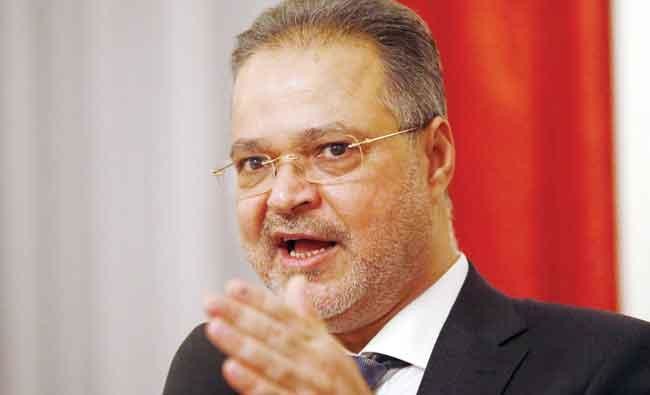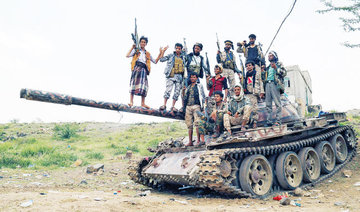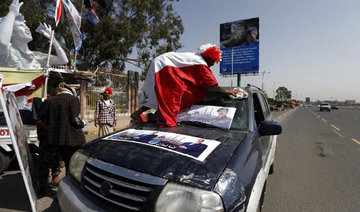UNITED NATIONS: Yemen’s foreign minister blamed Iran and its support for Houthi Shiite rebels on Monday for causing the country’s civil war and said it can’t be part of the solution.
Abdulmalik Al-Mekhlafi said at a press conference that Iranian weapons are still being smuggled into Yemen.
Saudi Arabia’s UN ambassador, Abdallah Al-Mouallimi, whose country supports Yemen’s internationally recognized government, said Iran isn’t a neighbor or part of the Arabian Peninsula and he had a more direct message: “Iran should get the hell out of the area, period.”
The Saudi and Yemeni officials spoke to reporters after a presentation to UN diplomats on the path to peace and humanitarian aid to Yemen.
Yemen, which is on the southern edge of the Arabian Peninsula, has been engulfed in civil war since September 2014, when the Houthis swept into the capital of Sanaa and overthrew President Abed-Rabbo Mansour Hadi’s internationally recognized government.
In March 2015, a Saudi-led coalition began a campaign in support of Hadi’s government and against Houthi forces allied with ousted President Ali Abdullah Saleh. Since then, the Iranian-backed Houthis have been dislodged from most of the south, but remain in control of Sanaa and much of the north.
The war in Yemen has killed over 10,000 civilians and displaced 3 million people. UN humanitarian chief Stephen O’Brien said Friday that 17 million Yemenis don’t know where their next meal is coming from, nearly 7 million are facing the threat of famine and almost 16 million lack access to clean water and sanitation. The World Health Organization said last week that 2,000 people have been killed and an estimated 500,000 infected in a cholera outbreak.
Al-Mekhlafi said that “the Yemeni government ... will not be an obstruction to peace.” But he said the Houthis and Saleh “cannot monopolize power.”
The two diplomats reiterated Yemeni and Saudi support for a proposal by UN envoy Ismail Ould Cheikh Ahmed to reopen Sanaa airport for commercial flights and to hand over the port of Hodeida to a committee of “respected Yemeni security and economic figures” that would use the port revenues to pay civil servants.
The Houthis have not accepted the proposal, but Cheikh Ahmed said Friday he hopes their leaders will accept his invitation to meet in a third country to discuss the proposals.
The Saudi ambassador warned diplomats to beware of three “fallacies” about Yemen.
First, Al-Mouallimi said, supporting a cessation of hostilities “actually means the de facto partition of Yemen and the consolidation of a reactionary movement that is tied with Iran in the north part of Yemen and a weak Yemeni state in the southern part of Yemen.”
“This is no recipe for sustainable peace,” he said, stressing that any cease-fire has to be linked to implementation of a 2015 UN Security Council resolution demanding that the Houthis withdraw from all areas they captured, hand over arms seized from military and security institutions, and stop all actions falling within the authority of the legitimate government.
Al-Mouallimi said the second fallacy “is that we must all sit around the table and talk.” He said there have been talks “everywhere,” including Geneva, Kuwait, Moscow and Saudi Arabia. Yemen’s recognized government has shown willingness to move forward with a political settlement, Al-Mouallimi said, while the Houthis have rejected Cheikh Ahmed’s proposal and refused to meet him.
The third fallacy, he said, is that people often seem to think that “a disastrous humanitarian situation, a catastrophic spread of cholera” afflict all of Yemen. But “all of that is concentrated in one part of Yemen which is controlled by the Houthis,” he said. Al-Mouallimi said the entire world, especially Saudi Arabia, is ready to provide aid but he said the Houthis are unable or “sometimes maybe unwilling” to manage and distribute aid.
Looking ahead, Yemen’s foreign minister predicted that “in the end,” the parties will get to the place where they started — when the end of a national dialogue in January 2014 all political parties agreed on a road map for a political transition.
But unfortunately, to get there Yemenis will have “paid a high price for peace,” Al-Mekhlafi said.
Yemen blames Iran for war, says it can’t be part of solution
Yemen blames Iran for war, says it can’t be part of solution

Britain says Israel’s detention of two UK MPs ‘unacceptable’

- “I have made clear to my counterparts in the Israeli government that this is no way to treat British Parliamentarians, and we have been in contact with both MPs tonight to offer our support,” Lammy said
LONDON: Britain’s Foreign Secretary David Lammy said Saturday it was “unacceptable” and deeply concerning that Israel had detained two UK lawmakers and denied them entry.
Yuan Yang and Abtisam Mohamed, from the governing Labour Party, flew from London to Israel but were blocked from entering the country and deported, British media reported.
“It is unacceptable, counterproductive, and deeply concerning that two British MPs on a parliamentary delegation to Israel have been detained and refused entry by the Israeli authorities,” Lammy said in a statement.
“I have made clear to my counterparts in the Israeli government that this is no way to treat British parliamentarians, and we have been in contact with both MPs tonight to offer our support.
“The UK government’s focus remains securing a return to the ceasefire and negotiations to stop the bloodshed, free the hostages and end the conflict in Gaza.”
Since renewed military operations last month ended a short-lived truce in its war with Hamas, Israel has pushed to seize territory in the Gaza Strip in what it said was a strategy to force militants to free hostages still in captivity.
The health ministry in Hamas-run Gaza said 1,249 people have been killed since Israel resumed intense bombing last month, bringing the overall death toll since the war began to 50,609.
The October 7, 2023 attack on Israel that sparked the war resulted in 1,218 deaths, mostly civilians, according to an AFP tally based on official Israeli figures.
Tunisia shuts down large migrant camps

- The camps had prompted anger from residents in nearby villages, raising pressure on the authorities
EI AMRA, Tunisia: Tunisia has dismantled camps housing thousands of undocumented migrants from sub-Saharan Africa, police said, following a campaign against them on social media.
Around 20,000 migrants had set up tents in fields in the eastern regions of El-Amra and Jebeniana, said national guard spokesman Houcem Eddine Jebabli.
He said around 4,000 people of various nationalities had left one of the camps cleared by authorities, and operations would continue over the coming days.
Some of the migrants had “dispersed into the countryside,” with pregnant women and the infirm taken care of by the health authorities, he added.
The camps had prompted anger from residents in nearby villages, raising pressure on the authorities.
Jebabli said locals had taken legal action over the occupation of their olive groves by the migrants.
“It was our duty to end all the disorder,” he said.
Tunisian President Kais Saied on March 25 called on the International Organization for Migration to accelerate voluntary returns for irregular migrants to their home countries.
In recent years, Tunisia has become a key departure point in North Africa for migrants crossing the perilous Mediterranean Sea in hopes of reaching Europe.
Italy has agreements with Tunisia and Libya to provide funding in exchange for help stemming departures.
Italy plans to invest €20 million ($22 million) in a new project to help Algeria, Libya, and Tunisia send irregular migrants from their territories back to the migrants’ countries of origin.
The government of Prime Minister Giorgia Meloni has vowed to cut irregular migration to Italy’s shores from North Africa — the majority of whom depart from Libya and Tunisia.
But many of the migrants who depart hail from other countries, especially sub-Saharan African countries.
Italy’s new plan “focuses on strengthening the institutional and administrative-managerial capacities of the partner countries,” with the involvement of 400 officials, Italy’s Foreign Affairs Ministry said in a recent statement.
Irregular migration would be better addressed “through the improvement and development of assisted voluntary repatriations from Algeria, Libya and Tunisia to the countries of origin,” it said.
It said the project would collaborate with the IOM to ensure migrants’ rights.
The ministry said the plan would benefit “around 3,300 of the most vulnerable migrants, carrying out their repatriation to their countries of origin sustainably and effectively.”
It said Italy’s Agency for Development Cooperation, which helps carry out development activities, would provide technical support.
The agency has also been charged with another plan targeted at the “socio-economic reintegration of returning migrants,” tapping Italian companies and civil society groups, it said.
On Wednesday, Libyan authorities said they would suspend the work of 10 international humanitarian groups, including Doctors Without Borders, accusing them of a plan to “settle migrants” from other parts of Africa in the country.
Israeli general condemns West Bank settler riot, ‘vandalism’ by troops

- Major General Avi Bluth addressed a “series of unusual incidents” while visiting Israeli police officers in the West Bank
- Bluth “emphasized that these are exceptional incidents that must be addressed with the necessary severity“
RAMALLAH, Palestinian Territories: The Israeli military’s top commander in the occupied West Bank condemned recent violence by Israeli settlers against police and “unacceptable” conduct by soldiers, in a video shared by the army on Friday.
A military statement said that Major General Avi Bluth addressed a “series of unusual incidents” while visiting Israeli police officers in the West Bank, near the site of a riot involving settlers earlier this week.
Israeli police said they had arrested 17 suspects over the “violent riot” on Wednesday near the settlement outpost of Givat Habaladim, northeast of the Palestinian city of Ramallah, during which Israeli settlers threw stones at officers and torched a police car.
Bluth “emphasized that these are exceptional incidents that must be addressed with the necessary severity,” the military statement said.
Referring to the settlers’ attack on Israeli forces, Bluth said in the video: “Beyond the fact that this is a red line that has been crossed and will be dealt with seriously, there is no greater act of ingratitude.”
Rights groups often accuse the army of protecting Israeli settlers in the West Bank, and the United Nations has said that settler attacks against Palestinians are taking place in a climate of “impunity.”
In a recent incident Bluth did not address in the video, the army said that this week “dozens of Israeli civilians... set fire to property” in the Palestinian village of Duma, injuring several people.
The Israeli general mentioned “vandalism and graffiti” by reserve soldiers during a military raid on Wednesday, in the Dheisheh refugee camp near Bethlehem.
While a major offensive since January has focused on refugee camps in the northern West Bank, Dheisheh in the south has seen an uptick in Israeli army raids in recent weeks.
Images shared on social media showed vandalized apartments, where furniture was broken and Israeli nationalist slogans spray painted on walls.
Bluth said that “the conduct in Dheisheh by our reserve soldiers is not what we stand for.”
“Vandalism and graffiti during an operational mission are, from our perspective, unacceptable incidents. It is inconceivable that IDF (army) soldiers do not act according to their commanders’ orders,” he said.
Since war began in October 2023 in the Gaza Strip — a separate Palestinian territory — violence has soared in the West Bank.
Israeli troops or settlers have killed at least 917 Palestinians, including militants, in the West Bank since October 2023, according to Palestinian health ministry figures.
Palestinian attacks and clashes during military raids have killed at least 33 Israelis, including soldiers, over the same period, according to official figures.
Israel has occupied the West Bank, home to about three million Palestinians, since 1967.
Excluding annexed east Jerusalem, around 490,000 Israelis live there in settlements and outposts that are illegal under international law. Outposts are also illegal under Israeli law.
Macron to hold Gaza summit with Egyptian, Jordanian leaders

- The French president is expected in Cairo on Sunday evening
- The trilateral summit will be held the same day
PARIS: French President Emmanuel Macron on Saturday said he would hold a trilateral summit on the situation in Gaza with Egypt President Abdel Fattah El-Sisi and Jordan’s King Abdullah II.
Israel has pushed to seize territory in Gaza since the collapse of a short-lived truce in its war with Hamas, in what it has called a strategy to force the militants to free hostages still in captivity.
Simultaneously, Israel has escalated attacks on Lebanon and Syria.
“In response to the Gaza emergency and during my visit to Egypt at President El-Sisi’s invitation, we will hold a trilateral summit with the Egyptian president and the King of Jordan,” Macron wrote on X ahead of his trip.
The French president is expected in Cairo on Sunday evening, where he will hold talks with his Egyptian counterpart on Monday morning.
The trilateral summit will be held the same day in the Egyptian capital, according to Macron’s office.
On Tuesday, Macron will also visit the Egyptian port of El-Arish, 50 kilometers (30 miles) west of the Gaza Strip, to meet humanitarian and security workers and demonstrate his “constant mobilization in favor of a ceasefire.”
El-Arish is a transit point for international aid intended for Gaza.
Libya’s anti-NGO push seen as diversion from internal failures, analysts say

- Anas Al-Gomati, director of the Tripoli-based Sadeq Institute think tank, said “this isn’t about NGOs — it’s about creating enemies to distract from failures“
- Libya analyst Jalel Harchaoui noted that the Tripoli government is adopting a similar tone to Tunisian President Kais Saied
TUNIS: Libya’s suspension of 10 international humanitarian groups, part of a broader crackdown on African migrants, is aimed at masking domestic failures and securing external concessions, particularly from Europe, analysts have said.
Libya’s Tripoli-based authorities announced on Wednesday a decision to suspend the Norwegian Refugee Council, Doctors Without Borders (MSF), Terre des Hommes, CESVI and six other groups, accusing them of a plan to “settle migrants” from other parts of Africa in the country.
War-torn Libya is a key departure point on North Africa’s Mediterranean coast for migrants, mainly from sub-Saharan African countries, risking dangerous sea voyages in the hope of reaching Europe.
Anas Al-Gomati, director of the Tripoli-based Sadeq Institute think tank, said “this isn’t about NGOs — it’s about creating enemies to distract from failures.”
The UN-recognized government of Abdulhamid Dbeibah is “tapping into conservative anxieties while masking their inability to provide basic services,” he told AFP.
Libya has struggled to recover from the chaos that followed the 2011 NATO-backed uprising that overthrew longtime leader Muammar Qaddafi.
It remains split between the UN-recognized government in Tripoli and a rival authority in the east, backed by military strongman Khalifa Haftar.
The ultimate goal, according to Gomati, is to “extract concessions from Europe which, fearing potential migration surges, will offer new funding packages and prop up the government in Tripoli.”
On Wednesday, Rome announced the allocation of 20 million euros to the International Organization for Migration (IOM) to finance “voluntary repatriations” for 3,300 sub-Saharan migrants who arrived in Algeria, Tunisia and Libya.
“This isn’t coincidence — its coordination. The Libyan authorities shut down NGOs providing monitoring and protection (for migrants) precisely as Italy announces 20 million euros for ‘voluntary’ returns,” said Gomati.
“Italy gets to claim they’re funding ‘voluntary’ returns while Libya gets to demonstrate ‘sovereignty’, all while vulnerable migrants face extortion in detention before being labelled ‘volunteers’ for deportation.”
Libya analyst Jalel Harchaoui noted that the Tripoli government is adopting a similar tone to Tunisian President Kais Saied, who in early 2023 denounced what he called “hordes of sub-Saharan migrants” who threatened to “change the country’s demographic composition.”
Harchaoui, of the London-based Royal United Services Institute, said Dbeibah was facing considerable difficulties, particularly in gaining access to public funds, and his once pragmatic relationship with the Haftar family in the east had deteriorated.
The two rivals had previously struck a kind of non-aggression pact in exchange for sharing oil revenues.
“In its bid to assert control and project strength, the Dbeibah government has turned to demonizing sub-Saharan migrants and denouncing NGOs,” Harchaoui said.
This aims to “show who’s in charge in Tripoli and create the illusion that he is curbing migration flows.”
Exiled Libyan human rights activist Husam el-Gomati said on X that “this crackdown appears not only to limit the influence of these organizations but also to prevent the documentation of human rights violations and delay any potential punitive measures against militia leaders involved in these abuses.”
Various reports from the United Nations and NGOs such as Amnesty International have denounced the arbitrary detentions of government opponents, journalists and lawyers in recent months, as well as abuses against migrants, including the discovery of mass graves.
Following the NGO ban, aid groups have expressed concern for both their Libyan colleagues and the migrants who have been made more vulnerable in a country that, according to the IOM, is home to more than 700,000 residents from sub-Saharan countries.
The International Commission of Jurists on Friday condemned the “recent collective expulsions, arrests, violent attacks and the surge of hate speech, including that which constitutes incitement to violence, against migrants, refugees and asylum seekers in Libya.”
The organization noted that the Libyan interior ministry has pledged “the deportation of 100,000 migrants every four months.”






















